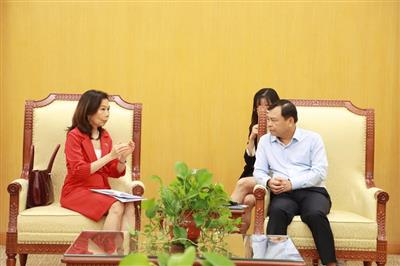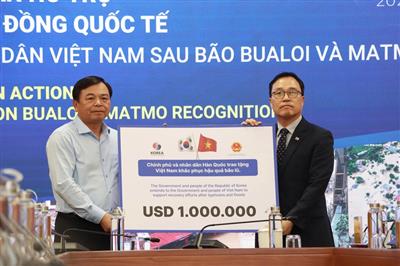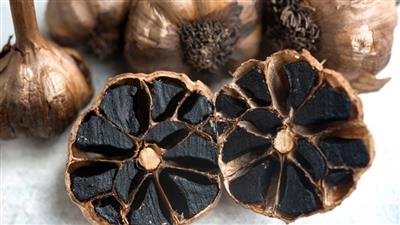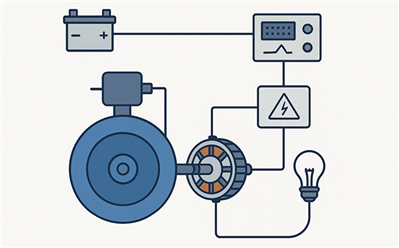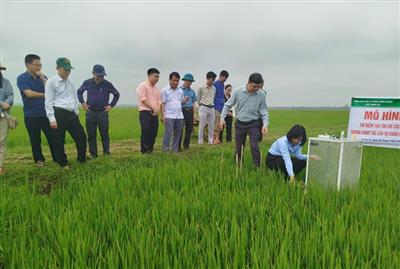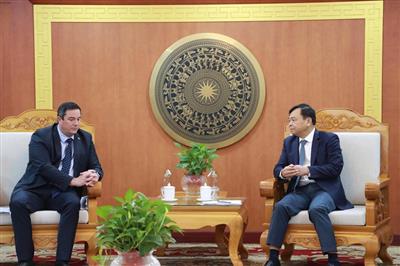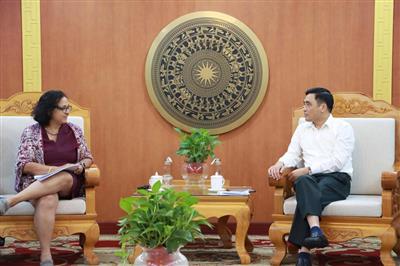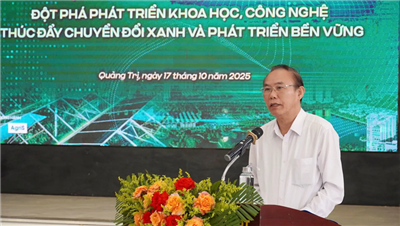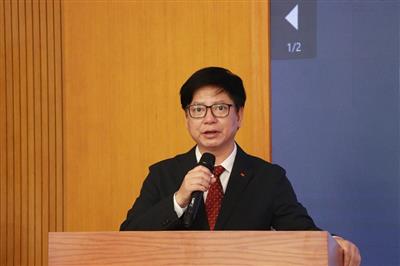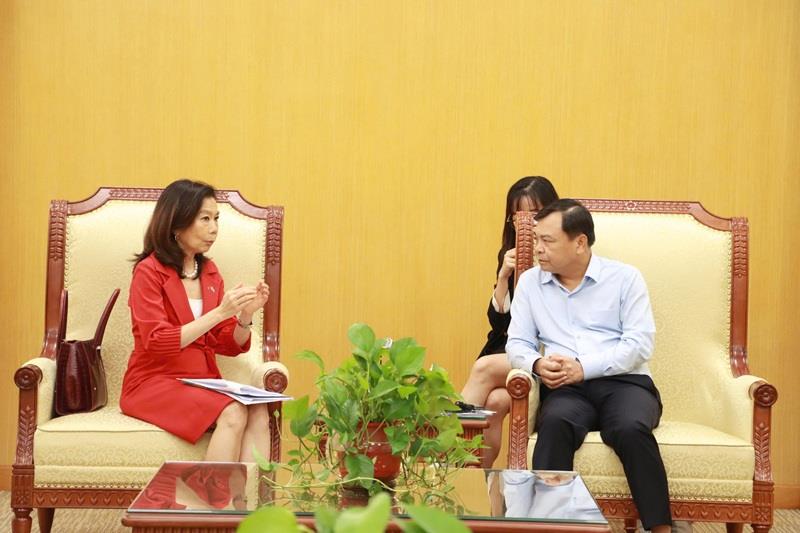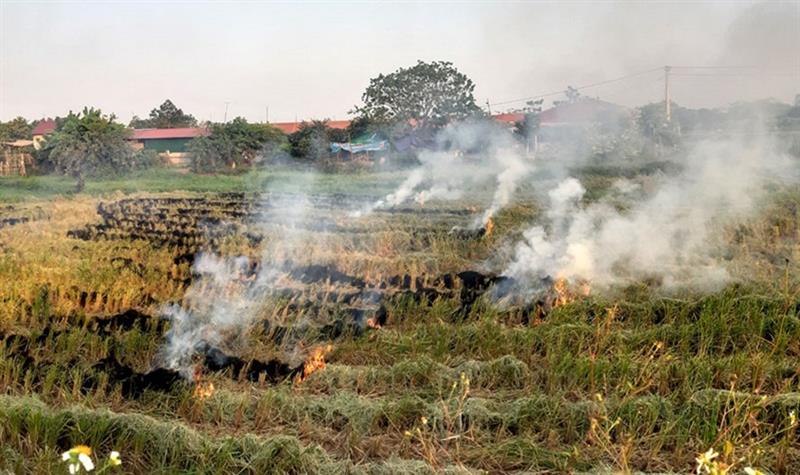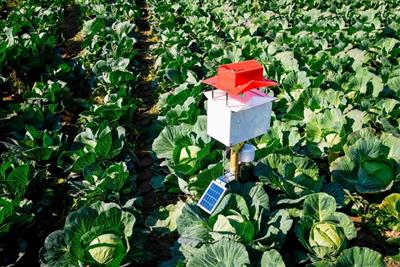
Empowering women in the circular economy: Insights from experts and entrepreneurs
11/11/2024TN&MTOn November 6, 2024, at the Women's and Development Center (Tay Ho, Hanoi), Natural Resources and Environment Magazine, in collaboration with the Central Propaganda Department of the Vietnam Women's Union (VWU), organized the forum titled "Women pioneering in circular economy development." This event aimed to bring together leaders, scientists, and startup models to discuss and exchange ideas on solid waste management, drivers of circular economy development, waste classification and treatment models, and environmentally friendly production. The forum also emphasized women's role and identified challenges in environmental protection activities to achieve green and circular economic development.

Delegates attending the "Pioneering women in circular economy development" forum
The forum was attended by Ms. Nguyen Thi Minh Huong, Vice President of the VWU; Ms. Nguyen Thi Kim Dung, Member of the Presidium and Head of the Propaganda Department of the VWU; Dr. Dao Xuan Hung, Editor-in-Chief of the Natural Resources and Environment Magazine; Ms. Tran Thi Cam Thuy, Deputy Editor-in-Chief of the Magazine; Associate Professor Dr. Nguyen Dinh Tho, Director of the Institute of Strategy and Policy on Natural Resources and Environment; Dr. Nguyen Thi Phuong Mai, Deputy Director of the Vietnam environmental and marine sciences institute; Dr. Vu Van Doanh, Deputy Head of the Department of Environment, Hanoi University of Natural Resources and Environment; MSc. Tran Thi My Hai, Chairwoman of the Vietfiber; Mr. Le Van Thanh from the European Union's organization in Vietnam; Ms. Le Thi Thien Huong, Deputy Chairwoman of the Hanoi Women's Union; Ms. Nguyen Thi Thu Huong, Head of the Women's Economic Development Support Department, Bac Ninh Women's Union; MSc. Le Thi Minh Anh, expert from the Pollution Control Department and many members, women from Hanoi districts, as well as representatives from media agencies.

Vice President of the Vietnam Women's Union, Nguyen Thi Minh Huong, delivering the opening speech
In her opening speech, Ms. Nguyen Thi Minh Huong, Vice President of the VWU, mentioned that this forum serves as a concrete step in the coordinated communication program on waste management and solid waste sorting from 2024 to 2027 between the Ministry of Natural Resources and Environment and the VWU. She emphasized the forum as a platform for sharing practical experiences in solid waste management and environmental protection, contributing to the circular economy.
Women as the driving force in environmental protection
With the backdrop of a rapidly growing population and socio-economic development, solid waste has become a significant challenge to the environment and public health. In Vietnam, approximately 68,000 tons of solid waste are generated daily. However, about 70% of this waste is still disposed of by landfilling and burning, wasting valuable land and water resources and causing environmental pollution. Much recyclable waste is not sorted at the source, leading to substantial wastage. Recycling not only contributes to environmental protection but also supports green and circular economies, aligning with the Environmental Protection Law 2020 and Vietnam's net-zero emissions commitment by 2050 at COP 26.

Over 250 women delegates from Hanoi participated, contributing numerous ideas for discussion
According to Ms. Nguyen Thi Minh Huong, women play a leading role in environmental protection and green economic development. They are vital and proactive in various fields, especially the circular economy—a model that maximizes resource reuse and minimizes environmental impact. In Southeast Asia, Vietnam leads in female entrepreneurship, with 27.2% of companies, cooperatives, and over 20% of small and medium-sized enterprises run by women.
In recent years, the VWU has collaborated with several ministries, sectors, and localities to implement environmental protection activities, such as the "Anti-plastic waste" campaign, the "One billion trees" project, and the "Building families with 5 No’s, 3 Clean’s" program. Women's unions at all levels have focused on raising awareness, encouraging members and communities to participate in waste collection and recycling initiatives. Many safe environmental initiatives and eco-friendly products have been successfully implemented and promoted in communities, contributing to sustainable economic development. Through this forum, Ms. Nguyen Thi Minh Huong expressed her hope that women would continue to take the initiative in managing solid waste at its source, promoting green consumption, and advancing the circular economy.
Role of women and community in source-based waste sorting
In the first session of the Forum, MSc. Le Thi Minh Anh, an expert from the Pollution Control Department (Ministry of Natural Resources and Environment), presented a report titled “Regulations on the management and classification of domestic solid waste according to the 2020 Law on Environmental Protection.” According to MSc. Le Thi Minh Anh, the approach of the 2020 Law on Environmental Protection regards waste as a resource, with the aim of maximizing the value of discarded products and promoting a circular economy for sustainable development. Accordingly, all waste is evaluated for recycling and treatment using suitable methods to minimize waste disposal in the environment, moving toward a zero-waste society.

MSc. Le Thi Minh Anh, an expert from the Department of Environmental Pollution Control, presents the “Regulations on the management and classification of domestic solid waste according to the 2020 Environmental Protection Law”
Priorities in solid waste management include maximizing the value of solid waste and discarded products to reduce natural resource exploitation and minimize environmental impacts. The principles of solid waste classification are based on maximizing the value of discarded products and solid waste to reduce the exploitation of natural resources and mitigate environmental harm. This approach follows a priority hierarchy: from reduction to reuse of discarded products, repair or upgrade to extend usage, and reuse of components. Solid waste is categorized into reusable and recyclable waste (with no collection and transportation fees), food waste (which can be recycled for animal feed or organic fertilizer), and other domestic solid waste. According to current regulations, waste classification at source must be implemented no later than December 31, 2024. The Ministry of Natural Resources and Environment has issued technical guidelines on domestic solid waste classification in official dispatch No. 9368/BTNMT-KSONMT.
Benefits of domestic solid waste classification include maximizing the components in waste, applying appropriate treatment methods to each type of waste to save resources and waste treatment costs, reducing the volume of waste needing treatment, and providing advantages to waste producers by utilizing recyclable waste and self-produced compost. It helps reduce environmental pollution by decreasing the volume and concentration of leachate and reducing methane emissions at landfills, lowering landfill area usage, and decreasing the total amount of waste discharged into the environment, thereby lessening environmental pressure and saving collection, transport, and treatment costs. It also raises public awareness about environmental protection and the rational use of resources.

Dr. Vu Van Doanh, Deputy Head of the Environmental Department, Hanoi University of Natural Resources and Environment, shares international experiences in household waste sorting and treatment
Sharing international experiences on domestic solid waste classification, Dr. Vu Van Doanh, Deputy Dean of the Faculty of Environment at Hanoi University of Natural Resources and Environment, informed that in South Korea, the government introduced a waste classification program in 1995, starting in developed areas. Waste is classified into three special bags: general waste, incinerable waste, and food waste. Residents buy waste bags at supermarkets and may only use them within their residential area. These bags range from 5 to 50 liters, costing from $0.12 to $1, with 60% of disposal costs covered by local authorities. For bulky waste, residents pay a fee of $10 to $20 per item. Violations of classification regulations or improper use of bags are fined 100,000 won (about $85). Remarkably, the recycling rate in South Korea reaches 60-70%, with revenue from waste collection offsetting 30-40% of treatment costs, with the remainder supported by the government.
Meanwhile, Japan emphasizes waste classification awareness from an early age. Elementary school textbooks include lessons on types of waste, collection, and disposal methods, and students participate in classroom cleaning activities. Each locality in Japan has its own waste management system. Japanese residents are required to classify and clean waste according to guidelines and ensure it is disposed of on the designated day using correctly colored bags. Non-compliance results in waste being returned to the household, and violators are fined.
In the Philippines, the government established a legal framework for waste management starting in the 2000s. Republic Act 9003 established a Materials Recovery Facility (MRF) in each area and banned the incineration of all waste types.

Mrs. Le Thi Thien Huong, Vice President of the Hanoi Women's Union, shares experiences in mobilizing women members in the capital to implement household solid waste sorting and treatment at source
At the forum, Ms. Le Thi Thien Huong, Vice President of the Hanoi Women's Union, shared experiences in mobilizing members and women in the capital to implement the classification and treatment of domestic solid waste at source, moving toward a circular economy. Recognizing the role and responsibility of women and the Women's Union organization in proactively addressing environmental issues in the city, the Hanoi Women's Union has, over many years, directed district/ward-level Women’s Unions and grassroots branches to innovate communication methods to raise awareness among members and women about environmental protection. They have established many models with widespread impact in the community, such as “Turning garbage sites into flower gardens managed by women,” “Murals and flower streets managed by women,” “Trading recyclables for trees,” “Clean fields,” “Women say no to single-use plastic waste,” “Friendly garbage bins,” and more recently, models for “Classifying and treating organic waste at households,” “Post-harvest straw processing,” “Civilized garbage stations,” and “Battery homes.”
Beyond promoting waste classification and treatment, the Hanoi Women's Union has been flexible in developing innovative models to encourage a circular economy through waste. According to Ms. Le Thi Thien Huong, classified and efficiently utilized domestic solid waste becomes a highly valuable resource, which, when effectively exploited, can generate revenue for reinvestment locally, fostering circular economic development. Solid waste can become an input material for other production fields. However, challenges remain in implementing and scaling effective models of domestic solid waste classification and treatment toward a circular economy, preventing these models from fully realizing their potential.

Mrs. Nguyen Thi Thu Hương, Head of the Economic Development Support Committee of the Bac Ninh Women's Union, introduces the model for organic waste classification and treatment using indigenous microorganisms (IMO)
Presenting on the implementation of organic waste classification and treatment models using indigenous microorganisms (IMO) to protect the environment, Ms. Nguyen Thi Thu Huong, Member of the Standing Committee and Head of Economic Development Support for Women at the Bac Ninh Women’s Union, shared that the Union has implemented the organic waste classification and treatment model using IMO to contribute to environmental protection. The Union has organized training sessions to guide household waste classification and taught residents how to make IMO themselves to treat organic waste, neutralize odors from wastewater, and manage livestock manure. Phu Du Hamlet in Quynh Phu Commune was selected as a pilot site with the “Women Classify and Treat Organic Waste with IMO” program. This model enables residents to make IMO at home using affordable, readily available materials, with multiple applications, including diluting it as an odor neutralizer, using it as organic fertilizer, or as a pesticide.
Building on this success, the Bac Ninh Women's Union has scaled the model across the province, involving 48,845 households (24.1%) and 85 communes (67.4% of communes) in forming Women’s Committees to implement household waste classification and treatment. To expand the program's effectiveness, the Women's Union has organized 731 training sessions for 131,580 participants and 965 awareness events on waste classification and IMO techniques, reaching 176,896 people. Through these efforts, 46,835 member households (23%) have classified waste at source and used IMO. Many Union branches have been tasked with establishing teams specializing in IMO production to treat organic waste and manage local dump sites, contributing to the improvement of the local environment.
Women leading the way in circular economy development
During the forum's discussion session, delegates delved into the theme, "Women leading the way in circular economy development." Experts and business representatives contributed to this exchange, including Assoc. Prof. Dr. Nguyen Dinh Tho, Director of the Institute of Strategy and Policy on Natural Resources and Environment; Dr. Nguyen Thi Phuong Mai,
Deputy Director of the Vietnam environmental and marine sciences institute; MSc. Tran Thi My Hai, Chairwoman of the Vietfiber and Dr. Dao Xuan Hung, Editor-in-Chief of the Natural Resources and Environment Magazine.

Delegates participate in discussions and answer questions on the topic “Pioneering Women in Circular Economy Development”
Assoc. Prof. Dr. Nguyen Dinh Tho began with insights into Vietnam’s current circular economy landscape. He emphasized that while promoting a circular economy in Vietnam has distinct advantages, there are also challenges. A major benefit is the strong support from the legal framework and state policies, such as waste segregation at source, which will take effect from January 1, 2025. Additionally, Vietnam has introduced waste discharge fees for organizations and individuals, encouraging waste reduction and recycling. Green economy initiatives and eco-labeling are also gradually being adopted, creating incentives for businesses to participate in the circular economy. However, as Dr. Tho noted, challenges persist, especially in finance, technology, and human resources. He also highlighted that women play a pioneering role, especially in waste management and recycling, contributing significantly to sustainable development. With waste segregation at the source soon to be mandatory, he encouraged the Women's Union and its members to lead the way in motivating communities to participate in waste separation.
Dr. Nguyen Thi Phuong Mai spoke on the relationship between household waste segregation and the circular economy. She emphasized that women are the primary drivers in household waste management, taking on key roles in sustainable practices. In her view, women not only engage directly in recycling but also guide and monitor their family members in waste handling. With their influence in purchasing decisions, women can promote environmental-friendly products, fostering positive change. Dr. Mai suggested that authorities create conditions for female entrepreneurs to access funding more equitably and enhance their capacity through training, supporting them in developing circular economy chains.

Promotional publications on houssehold waster separation and treatment at the source were also introduced at the Forum
From a business perspective, MSc. Tran Thi My Hai shared about her project to develop fibers from pineapple leaves—an innovative step toward premium green fashion. She noted that thousands of tons of pineapple fibers go to waste each year in Vietnam, causing environmental harm. Her project not only produces eco-friendly products but also creates jobs for thousands of workers. To ensure sustainable development, she called for state support in sourcing pineapple fibers and developing fiber-processing factories.
In the discussion, Dr. Dao Xuan Hung, Editor-in-Chief of the Natural Resources and Environment Mgazine, emphasized the media’s role in raising awareness and promoting community action on environmental protection and circular economy, particularly highlighting the role of women. Dr. Dao Xuan Hung pointed out that his journal, along with other media outlets, plays a crucial role in sharing the inspirational stories of women in environmental protection, including waste separation at source. Through journalism, specific actions and exemplary models of women striving to maintain a clean, green environment have been widely covered, fostering community awareness. For instance, in Hanoi, the "Women's managed pathway" initiative has become a symbol of environmental preservation efforts, spreading a culture of public hygiene and social responsibility.

The Forum also provides an opportunity for businesses to showcase eco-friendly, green products to women members
Dr. Dao Xuan Hung also stressed the media's duty to not only showcase positive examples but also critique and address environmental violations. He cited cases where public dumping of waste and construction materials in public areas was improved thanks to strong media coverage, with many women participating in community clean-ups. He mentioned significant events organized by the Journal to promote the role of women in circular economy development, such as the 3rd environmental forum held in June 2024 with the theme “Household solid waste management and the role of businesses,” which gathered representatives from 63 provinces and cities and highlighted advanced models in waste separation and recycling. This forum provided a platform for Women’s Union members to exchange ideas and learn from one another, significantly enhancing community awareness about the circular economy, especially within the Women’s Union.

Delegates taking photos at the Forum
"Implementing household solid waste separation is fundamental to protecting the environment and effectively utilizing waste resources to establish a sustainable circular economy," Dr. Dao Xuan Hung emphasized. "To achieve this, we need the involvement of the entire community, with women playing an essential role in source segregation, spreading awareness, and fostering active participation in protecting our living environment."
The forum affirmed the pioneering role of women in environmental protection, not only as advocates but also as hands-on practitioners and supervisors of environmental actions within their own households. Insights shared by experts and business representatives demonstrated that women are—and will continue to be—a vital force in Vietnam's sustainable circular economy development.
Ngoc Huyen


